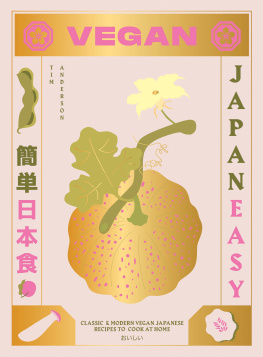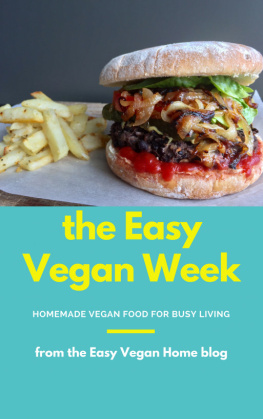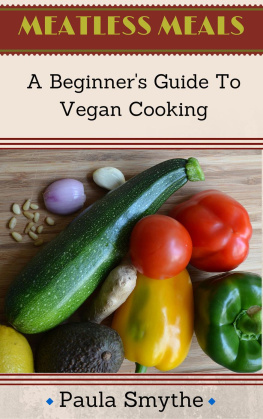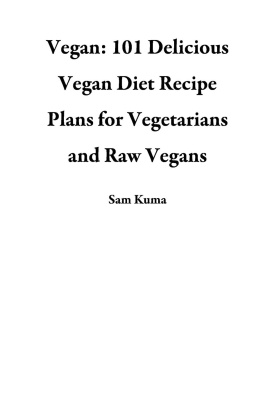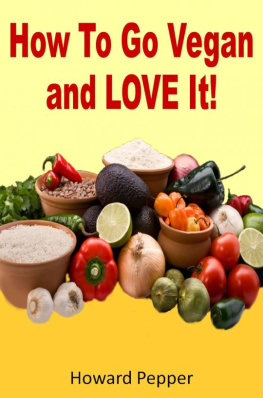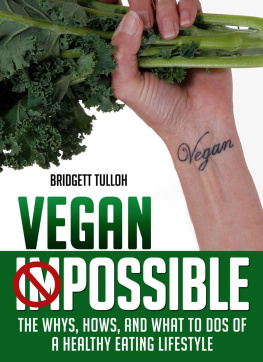Tim Anderson - Vegan JapanEasy
Here you can read online Tim Anderson - Vegan JapanEasy full text of the book (entire story) in english for free. Download pdf and epub, get meaning, cover and reviews about this ebook. year: 2020, publisher: Hardie Grant (UK), genre: Home and family. Description of the work, (preface) as well as reviews are available. Best literature library LitArk.com created for fans of good reading and offers a wide selection of genres:
Romance novel
Science fiction
Adventure
Detective
Science
History
Home and family
Prose
Art
Politics
Computer
Non-fiction
Religion
Business
Children
Humor
Choose a favorite category and find really read worthwhile books. Enjoy immersion in the world of imagination, feel the emotions of the characters or learn something new for yourself, make an fascinating discovery.
- Book:Vegan JapanEasy
- Author:
- Publisher:Hardie Grant (UK)
- Genre:
- Year:2020
- Rating:5 / 5
- Favourites:Add to favourites
- Your mark:
- 100
- 1
- 2
- 3
- 4
- 5
Vegan JapanEasy: summary, description and annotation
We offer to read an annotation, description, summary or preface (depends on what the author of the book "Vegan JapanEasy" wrote himself). If you haven't found the necessary information about the book — write in the comments, we will try to find it.
Vegan JapanEasy — read online for free the complete book (whole text) full work
Below is the text of the book, divided by pages. System saving the place of the last page read, allows you to conveniently read the book "Vegan JapanEasy" online for free, without having to search again every time where you left off. Put a bookmark, and you can go to the page where you finished reading at any time.
Font size:
Interval:
Bookmark:


JAPANESE CUISINE: FATTY TUNA!
WAGYU BEEF! DRIED FISH! PORK BROTH!
FRIED CHICKEN! SQUID GUTS! EGGS!
EGGS, EVERYWHERE! ITS A MINEFIELD
FOR MINDFUL VEGANS.
OR SO IT SEEMS. Of course, there are many Japanese delicacies that are off-limits for anyone who refrains from animal products. But Japanese cuisine in general is actually quite vegan-friendly an enormous amount of Japanese food is inherently vegan, and much more can be made vegan with just a simple substitution or two. And its not just austere, traditional Buddhist-temple fare (although that is very lovely indeed); you can enjoy the same big, bold, salty-sweet-spicy-rich-umami flavours of modern Japanese soul food without so much as glancing down the meat and dairy aisles.
Japanese dishes are often plant-based to begin with, since meat and milk were used sparingly throughout much of Japanese history, and most of Japans oh-so satisfying seasonings are based on naturally vegan fermented soybean and rice products. Yes, fish is an issue particularly the ubiquitous dashi that forms the basis of so many Japanese dishes but this is easily replaced with mushroom- and seaweed-based versions that are just as delicious.
But let me be clear: this book wont teach you how to make joyless vegan versions of Japanese meat and fish dishes, because they wouldnt be good, and theres no need to! Instead, this book will tap into Japans rich culture of cookery thats already vegan or very nearly vegan, so there are no sad substitutes and no shortcomings of flavour.
PLUS youll see that Japanese food isnt just vegan-friendly its also easy! Really, truly, embarassingly easy. So if youre new to veganism, new to Japanese cooking, new to both, or you just want to expand your meat-free repertoire, this is the book for you!
LETS CHARGE VALIANTLY FORTH AND COOK VEGAN THE JAPANEASY WAY!!!
BANZAI!!!
CONFESSION

IM NOT VEGAN. OR AT LEAST, NOT OFFICIALLY. BUT I AM VEGAN FREQUENTLY AND ACCIDENTALLY.
Let me explain. I do eat meat and cheese and eggs, and I wear leather. (What can I say? I look good in chaps.) I grew up in Wisconsin Americas Dairyland where Im pretty sure its against the law to be vegan in public. So, for better or worse, cheese and sausages are in my blood. And, while Ive never had any scorn for veganism the way some of my meat-eating brethren do, its just never been for me. I dont generally do well with restrictions, dietary or otherwise, primarily because I have no impulse control.
However, something weird happened over the past few years: I became kinda-sorta vegan by accident. In 2015, I opened my restaurant, Nanban, and for many months I was working there between 60 and 100 hours a week, so I rarely cooked at home. I had to change the way I shopped, since the fresh food I bought would often spoil before I had a chance to cook it. I wound up buying meat and fish very rarely and instead stocked up on things that would last, like root vegetables, frozen peas and spinach, tinned beans and tomatoes, and lots of pasta, noodles and rice. I still bought cheese and eggs, and cured meat and fish like bacon and anchovies, but I didnt actually use them that much. Over time, I realised that most of my cooking had become largely vegetarian and sometimes entirely vegan and I didnt even miss the meat and dairy. Hell, I hardly even noticed it was gone.
How could this be?! I was raised on bratwurst and frozen custard. If you cut me, I bleed fondue. The traditional dress of Wisconsin includes giant cheesehead hats made out of orange polyurethane foam. I honestly think I didnt go a single day without eating meat until I moved to California when I was 18. Yet there I was, in my South London flat, cooking vegan food and happily devouring it like some kind of hipster jackass. What would my parents say? What the hell happened to me?!
In short: Japan happened. Ive been obsessed with Japanese food since I was a teenager, and I lived in Japan for two years after studying Japanese food history in college. Now, some of you may already be aware that Japan is not a place that is particularly amenable to vegans, or even vegetarians. I actually dated a vegetarian for a few months in Japan, and going out with her was fraught with prohibitive complications. First of all, there were loads of places we simply couldnt go because they specialised in just one meaty or fishy thing, like sushi or grilled chicken or pork broth ramen. And then there were cultural differences regarding the definition of vegetarian (and the definition of meat) that made it tricky to ensure that a supposedly meat-free dish would be prepared without fish, or even chicken or pork (!). A friend of mine once joked that a common exchange between a vegetarian and a server in a Japanese restaurant might go like this:
IS THIS VEGETARIAN? YES.
DOES IT HAVE BACON IN IT? YES.
So it wasnt in Japan where I learned to appreciate vegetarian food in and of itself, because there wasnt that much of it going. But what I did learn was how awesome Japanese seasonings are, and how to combine and layer them to create wonderfully more-ish and satisfying meals, with or without meat. This is how so much of my cooking at home wound up accidentally vegan; when you have such fantastic, flavoursome ingredients at your disposal things like tangy miso, savoury shiitake mushrooms and zingy ponzu, to name a few then who needs meat? Japanese flavours are just that awesome. And not only that, but Japanese home cooking is usually really quick and easy; despite its reputation, most Japanese food doesnt require lots of prep or tricky techniques. Its so easy a (vegan) monkey could make it.


Not a joke this is Wisconsins actual nickname.
Also (sadly) not a joke.

One of the reasons Japanese cuisine has become so popular around the world is because of its ability to deliver rich, substantial, satisfying flavours even in lighter dishes that dont necessarily contain meat. This is largely because Japanese ingredients are rather good at delivering umami.
UMAMI is a basic taste; the best English translation we have for it is savouriness. However, despite its simplicity, its often made out to be something mysterious and inscrutable, erroneously described by charlatan chefs and Japanese gastronationalists as a perfectly balanced combination of other tastes, only attainable by master craftsmen. In an interview in The New Yorker, the founder of the Californian n-burger chain Umami Burger explained umami as an over-all harmonious state of perfection where the ingredients come together, a really rounded and harmonious dish. [The Japanese] have a sort of zen way of looking at it.
This is wrong. Its as wrong as saying that salty is the combination of sweet and sour. Its as wrong as saying that bitterness is an over-all bad-feeling frowny-face flavour. Its as wrong as saying that 1 + 1 = 4. It is categorically, decidedly, unquestionably wrong. It is a vortex of wrongness, dark and deep and swirling, leading into a wormhole of infinite stupidity. UMAMI IS A BASIC TASTE, as simple and straightforward as sweetness, saltiness, bitterness or sourness. So why is it so commonly misapprehended?
Next pageFont size:
Interval:
Bookmark:
Similar books «Vegan JapanEasy»
Look at similar books to Vegan JapanEasy. We have selected literature similar in name and meaning in the hope of providing readers with more options to find new, interesting, not yet read works.
Discussion, reviews of the book Vegan JapanEasy and just readers' own opinions. Leave your comments, write what you think about the work, its meaning or the main characters. Specify what exactly you liked and what you didn't like, and why you think so.

